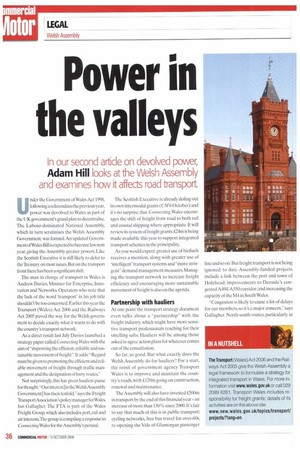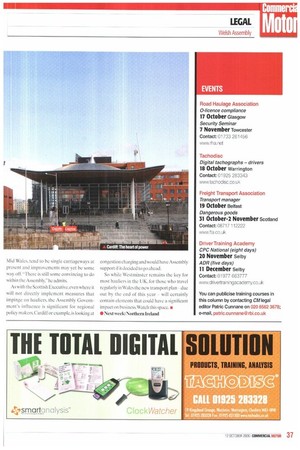Power in the valleys
Page 36

Page 37

If you've noticed an error in this article please click here to report it so we can fix it.
In our second article on devolved power, Adam Hill looks at the Welsh Assembly and examines how it affects road transport.
Undcr the Government of Wales Act 1998, following a referendum the previous year, power was devolved to Wales as part of the UK government's grand plan to decentralise. The Labour-dominated National Assembly, which in turn scrutinises the Welsh Assembly Government, was formed. An updated Government ofWales Bill is expected to become law next year, giving the Assembly greater powers. Like the Scottish Executive it is still likely to defer to the Treasury on most issues. But on the transport front there has been a significant shift.
The man in charge of transport in Wales is Andrew Davies, Minister for Enterprise, Innovation and Networks. Operators who note that the lack of the word 'transport' in his job title shouldn't be too concerned. Earlier this year the Transport (Wales) Act 2(X)6 and the Railways Act 2005 paved the way for the Welsh government to decide exactly what it wants to do with the country's transport network.
As a direct result last July Davies launched a strategy paper called Connecting Wales with the aim of "improving the efficient. reliable and sustainable movement of freight". It adds:"Regard must be given to promoting the efficient and reliable movement of freight through traffic management and the designation of lorry routes."
Not surprisingly this has given hauliers pause for thought."Our interest [in the Welsh Assembly Government] has risen tenfold," says the Freight Transport Association's policy manager forWales, Ian Gallagher. The FTA is part of the Wales Freight Group, which also includes port, rail and air interests:the group is compiling a response to Connecting Wales for the Assembly's perusal. The Scottish Executive is already doling out its own intermodal grants (CM 6 October) and it's no surprise that Connecting Wales encourages the shift of freight from road to both rail and coastal shipping where appropriate. It will review its system of freight grants:£24m is being made available this year to support integrated transport schemes in the principality.
As you would expect, greater use of biofuels receives a mention, along with greater use of 'intelligent' transport systems and "more stringent" demand management measures. Managing the transport network to increase freight efficiency and encouraging more sustainable movement of freight is also on the agenda.
Partnership with hauliers
At one point the transport strategy document even talks about a -partnership" with the freight industry, which might have more sensitive transport professionals reaching for their smelling salts. Hauliers will be among those asked to agree action plans for whatever comes out of the consultation.
So far, so good. But what exactly does the Welsh Assembly do for hauliers? For a start, the remit of government agency Transport Wales is to improve and maintain the country's roads, with £120m going on construction, renewal and maintenance.
The Assembly will also have invested £500m in transport by the end of this financial year—an increase of more than 150% since 2000. It's fair to say that much of this is in public transport: cycling networks, free bus travel for over-60s, re-opening the Vale of Glamorgan passenger line and soon. But freight transport is not being ignored: to date Assembly-funded projects include a link between the port and town of Holyhead: improvements to Deeside's congested A494/A550 corridor: and increasing the capacity of the M4 in South Wales.
"Congestion is likely to cause a lot of delays for our members, so it's a major concern," says Gallagher. North-south routes, particularly in
Mid Wales, tend to be single carriageways at present and improvements may yet he some way oft "There is still some convincing to do within the Assembly," he admits.
As with the Scottish Executive,even where it will not directly implement measures that impinge on hauliers, the Assembly Government's influence is significant for regional policy makers. Cardiff or example, is looking at congestion charging and would have Assembly support if it decided to go ahead.
So while Westminster remains the key for most hauliers in the UK, for those who travel regularly in Wales the new transport plan -due out by the end of this year — will certainly contain elements that could have a significant impact on business,. Watch this space. • • Next week: Non l kern Ireland










































































































































































































